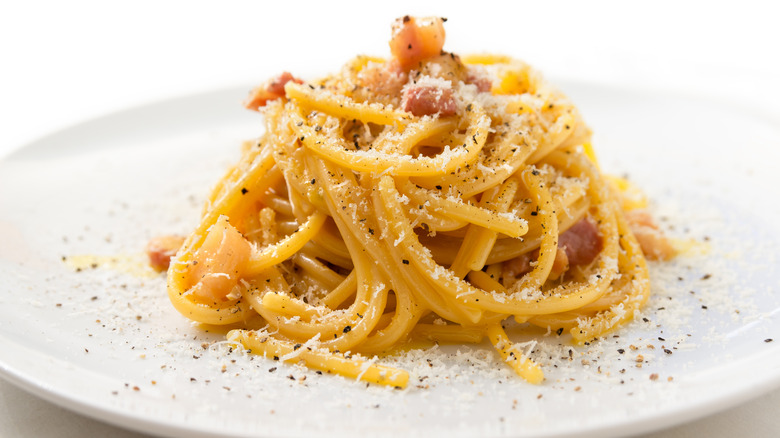The Unexpected Meaning Of The Word 'Carbonara'
When it comes to Roman pasta, carbonara is in the big four. According to MasterClass, the creamy, egg-based pasta holds rank amongst amatriciana, gricia, and cacio e pepe. A classic Roman carbonara sauce is made by mixing pasta water, egg yolks, cheese, pepper, and guanciale (or pork cheek). If you are vegetarian or need to stay kosher, try swapping out guanciale for zucchini to enjoy it the way they do in Rome's Jewish quarter (via La Cucina Italiana). Or if you're a fan of ultra-savory breakfasts, consider making a breakfast carbonara in lieu of scrambled eggs.
Carbonara is so engrained in Roman culture that CN Traveler says it's "the one dish you should always order in Rome." This suggestion is especially fitting, given the various narratives that surround the dish's origins. One particularly popular narrative posits that carbonara originated around WWII, during the Allies occupation of Italy. The story goes that a local Italian restaurant, hoping to appease U.S. servicemen desperate for bacon and eggs, combined the closest available ingredients with pasta, because ... it's still Rome.
Carbonara's possible connection to coal workers
Another hypothesis hones in on the dish's name. According to La Cucina Italiana, carbonara relates to the Italian word carbonaro, which translates to "coal burner." The linguistic connection between the pasta and coal has led many Italians to believe carbonara originated as a filling, easy-to-make dish that was first intended for men working outdoors. Cooking School Italy further outlines this theory, dubbing it the "Apennine Hypothesis." This belief posits that charcoal burners (carbonari) invented carbonara with ingredients that were easy to find in Italy.
Carbonara has solidified its status as a quintessential Italian food. Whether you credit carbonara's origins to Italian coal workers or resourceful Roman restauranteur or some other theory matters not — we're just glad to have the dish! And any meal that can hold its own alongside the likes of Neapolitan pizza, cheesy risotto, and Florentine steak deserves any and all origin stories.

